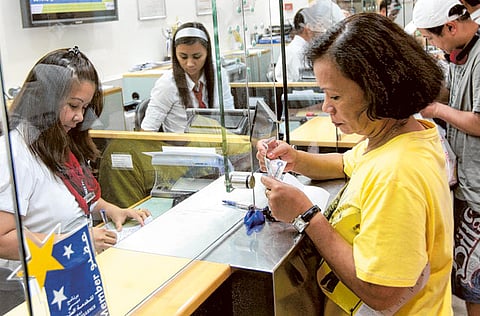Flexible currency basket could boost GCC development
Crawling peg would help smooth earnings and quell inflation

While the Middle East has suffered another flare-up in its constant battle with geopolitical instability, which limits funds flows from international investors to the region, comparatively it’s all quiet on the Western front.
With pending US presidential elections and thereafter the much-feared “fiscal cliff”, also the Eurozone’s efforts to keep its show on the road, sentiment is clouded, with persistent doubts over both the reliability of economic recovery and the policymaking surrounding it.
Spending last week in Cyprus, where the Troika (European Central Bank, European Commission and IMF) was due to agree a bailout, gave reminder that Europe is not only fractured in its centre, as France and Germany argue over banking union, but also fraying at the edges. It’s still not a great advertisement for monetary union.
What lesson will the Gulf choose to learn from such historic drama? The GCC is not the EU, of course — in its political and economic homogeneity, number of constituent national members, or resource endowment — and so may be better placed for currency unification, especially already having a roughly fixed exchange-rate system.
Still, as discussed last week, how that currency is managed may be as important as consolidating it into one unit. Syed Basher’s recent paper for Qatar Central Bank posited that correcting the prevailing undervaluation caused by the US dollar peg, and leaving inappropriately low interest rates behind, would have benefits for regional development.
Balance of payment surplus
“The GCC now has a vibrant non-hydrocarbon sector, relatively sophisticated financial sector and healthy balance of payment surplus,” he told me. “Further, both its imports and exports are increasingly exposed to Asian emerging countries [especially China], while its monetary policy remains guided by the Fed. The unreasonableness and unsustainability of this mix should be clear.”
A further reason for de-pegging is that whereas the US exports agricultural commodities, whose price will rise with the Fed’s third quantitative easing (QE3) policy, the GCC is a net importer, for which it will therefore be costly.
Responding to queries, Basher stated that “a political union is a necessary condition for the stability of a monetary union, but, with the Arab Spring threatening, is not unimaginable any more.”
While differential productivity rates, regardless of asymmetric shock disturbances, might in theory be problematic (such as in the contrast between Germany and Greece), Basher doubts that as a troubling factor. “For example, the private sector across the GCC is dominated by foreign workers, who exhibit somewhat similar skills across industries.”
Regional dinar
Wouldn’t Gulf governments be unwilling to limit their financial surpluses by re-rating of the putative regional dinar?
“The concept of money illusion is critical here,” he responds. “Revaluation [would] maintain the real value of foreign assets. We must think in terms of purchasing power, not the amount of money [per se].”
On the choice of exchange rate regime, the structural characteristics of the GCC economies should be kept in mind. One distinct possibility is the “basket, band, crawl” option popularised by Williamson, the paper suggested.
The basket involves pegging to a set of trading partners’ currencies. A target band would apply around the central parity, while the crawl denotes the continuous adjustment of the trade-weighted nominal effective exchange rate, by reference to the domestic inflation target relative to forecast inflation among trading partners. “For the fast-growing countries of the GCC, a crawling band offers flexibility to fight inflation,” Basher argues.
The pure floating option, though, would allow the possibility of transforming the GCC’s currency into a major international unit, given time. One way is by pricing exports (oil, natural gas) in that currency itself. The main impediment would be the lack of economic diversification within the union, leading to greater exchange rate volatility than under a managed float.
It is “plain logic”, says Basher, that “having a currency basket that includes the oil price would serve the dual objectives of smoothing revenues and stabilising inflation”.
The argument is cogent. Time will tell whether something like it succeeds.



